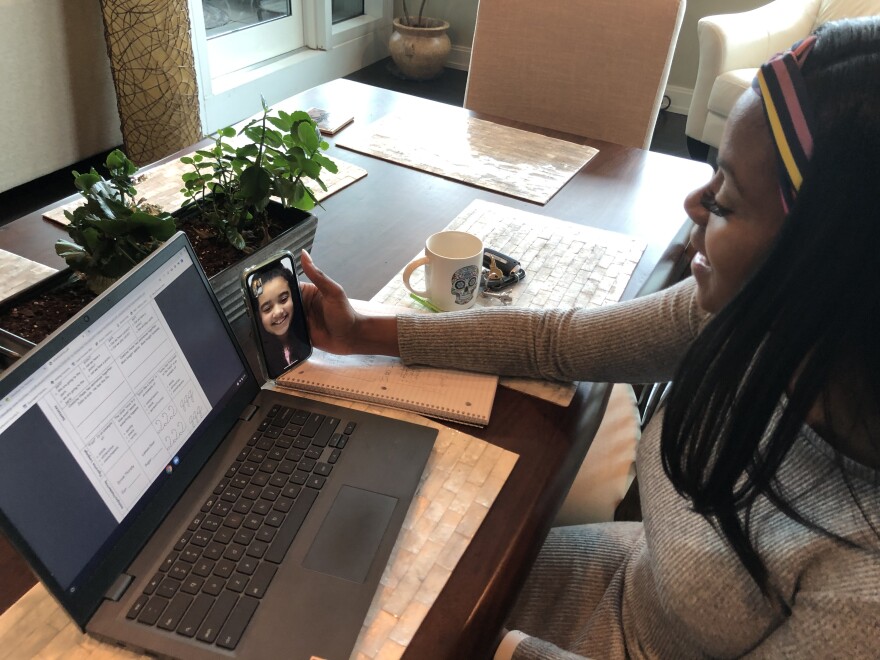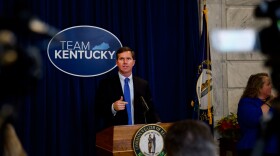It’s been one week since Jefferson County Public Schools started non-traditional instruction, or NTI. The district of 100,000 students has moved to online and distance learning through at least May 1 so that schools can stay closed to protect against the spread of COVID-19. So how is it going?
Flexibility, Communication Key For One Fourth Grade Teacher
Lincoln Performing Arts Elementary School teacher KeNiesha Watkins has been ahead of the game. Her students were already set up on Google Classroom even before the pandemic started. Google Classroom is the platform the district is asking teachers to use now to provide instruction during NTI.
Watkins said her fourth graders generally don’t have a problem with using Google Classroom — it’s the parents who are stressed.
"Technically my business hours are from 11 to 1," Watkins said, speaking with WFPL News on a web conferencing app from her apartment in downtown Louisville. "But I’ve been talking to parents until like 8 o'clock at night."
"The parents are just nervous because all this sounds like a whole bunch of new information, but it's new information to them — not their fourth grader," she said.
Watkins has had a few Google Meets with the whole class to check in and explain assignments. She says the fourth graders had no problem muting and unmuting themselves throughout the discussion.
As she explained her set up to WFPL News, Watkins used the screen share function on the web app to display her Google Classroom. Suddenly the audio and video quality dropped dramatically. Watkins sounded like she was talking underwater — she said it happens every time she shares her screen.
"I just dropped like 200 bucks to up my WiFi capability. So hopefully that will be in soon," she said.
But aside from the technical difficulties and some anxious parents, Watkins said NTI is going well. She’s in touch with all but one of her students: an English Language Learner (ELL) whose parent doesn't speak English very well. She said the school's ELL coordinator is working with her to get in touch.
The state is requiring students to have at least one interaction with a teacher per week to be counted present. That can be a message, a phone call, turning in an assignment, or participating in a Google Hangout. JCPS is encouraging, but not requiring, schools to be in touch more frequently than once a week. Frequency of contact is left up to teachers or principals. The district said most schools had contacted 90% of their students by day two.
For Watkins, NTI is mostly about being flexible, calming parents, and being reachable. Throughout her interview with WFPL News, her phone was constantly dinging with messages from parents and students. Watkins joked that she felt more like a business woman than a teacher.
"I feel like I have these clients who happen to be like 10," she laughed.
Teachers Working Out The Kinks
Teachers and administrators only had one day of training on NTI, on Monday April 6. On Tuesday April 7 they were expected to start instruction.
"OK, learn everything," was how Bloom Elementary computer science and mindfulness teacher Pat Coots described it.
The small amount of training meant that teachers spent a lot of the first week working out the kinks. Coots said her administration and the district were making changes on the fly. First the principal wanted teachers taking attendance once a week, then once a day. First they were allowed to use Zoom. But then "Zoom bombing" became a concern, so the district directed teachers to only use Google Meets. It was stressful, Coots said. But she doesn't blame her administrators, noting the novelty of the situation.
"Sometimes that's how you have to do it," she said.
Atherton High School English and philosophy teacher William Tucker is also figuring out how to make the most of this time for his students.
"Things they never tell you at Bellarmine University when you’re in grad school: 'this is how you teach during the great plague!'" he joked.
Tucker is meeting with each of his classes once a week through a Google Hangout, and communicating with students individually about their assignments and questions throughout the week.
"I had 35 seniors on one call two days ago, and it kind of got out of hand," he said. "They were worried about prom and graduation, and things are so uncertain. But mainly they just wanted to talk to each other."
For Tucker the biggest challenge is scheduling. He had to move his initial conference with his seniors three times before he found a window that worked. Like many teachers, he records the Hangouts so that students who missed them can watch later. For his seniors, he’s assigned them the novel "Beloved" by Toni Morrison. They'll meet once a week on a web chat for a seminar-style discussion. He's expecting the pandemic may mean students will be more engaged in reading than usual.
"Reading is a great distraction during all of this. And that’s about as tremendous a book as you can get into," he said.
Tucker said all his students have Internet access. But the district has provided paper packets of instructional materials to students who don’t. JCPS has designed "Choice Boards" with assignments and activities by grade level. Students and parents can pick up paper copies at meal sites.
Parents Wearing Many Hats
As teachers are working out the logistics, parents are too, often managing to be parent, employee, and teacher's aid all at the same time.
JCPS parent Cynthia Lee has three children. Two go to private school. Her oldest son, AJ is an eighth grader at Meyzeek Middle. So she's managing three different kids, with three different grade levels and two different schools.
"All the grades, and work that they have to do, and packets, and signing in, and logging in, and teachers who are changing their schedules like days before or even hours before — it’s a lot to manage and balance," she said.
Meanwhile Lee is also trying to work. She’s a pharmaceutical sales rep, and has to keep up her calls and conferences with physicians. Then there’s the device situation. Her older kids have their own smartphones, and there’s also an iPad. But there’s only one computer, which is the easiest to use for completing assignments.
"There are definitely fights over who gets the computer," Lee said. So far, Lee hasn't needed it herself, but that may change as the pandemic continues.
Like many parents, Lee is understandably stressed, but she worries even more for families who don’t have Internet at all, or for parents who can’t work from home like she can and help with schoolwork.
To manage stress, Lee said she's been taking the kids outdoors to exercise, or sending them to burn off some energy on the trampoline in the backyard. Sometimes, she joins them.
Her son AJ says he’s actually less stressed about school than usual. Teachers are mostly just using the Hangouts to check in, he says. And so far, they haven’t given him that much work, and he has more time to finish it.
"If we have like a Google Form test, I don’t have to get it done that period," he said. "I have like 24 hours to get it done. I think it’s a whole lot less stressful."
The district is trying to strike a delicate balance. JCPS is trying to keep students engaged, without requiring so much of them that they’re adding to the intense pressure families are already under.
Still, AJ says he’s hoping that by week two, teachers will have worked out the logistics and start offering more meaningful instruction.
District Calls First Week Of NTI A Success
JCPS superintendent Marty Pollio said in a press conference on Friday, that he's proud of the work schools and district employees have done in the first week of NTI.
"This has been a major lift for the district," Pollio said. "I think it’s one that’s been immensely successful."
Pollio was pleased with "attendance" rates, saying that by Wednesday of the first week, most schools had already contacted 90% of their students. Schools have been reaching out by phone, or even snail mail to students without Internet access.
Pollio said the district shipped out the last batch Friday of the 20,000 Chromebooks requested by low-income families. The 6,000 WiFi Hotspots the district has ordered for special education students should arrive "any day now," he said.
Going forward, Pollio said the district will try to continue improving communication with families, and keep instruction flexible during a very stressful time.






